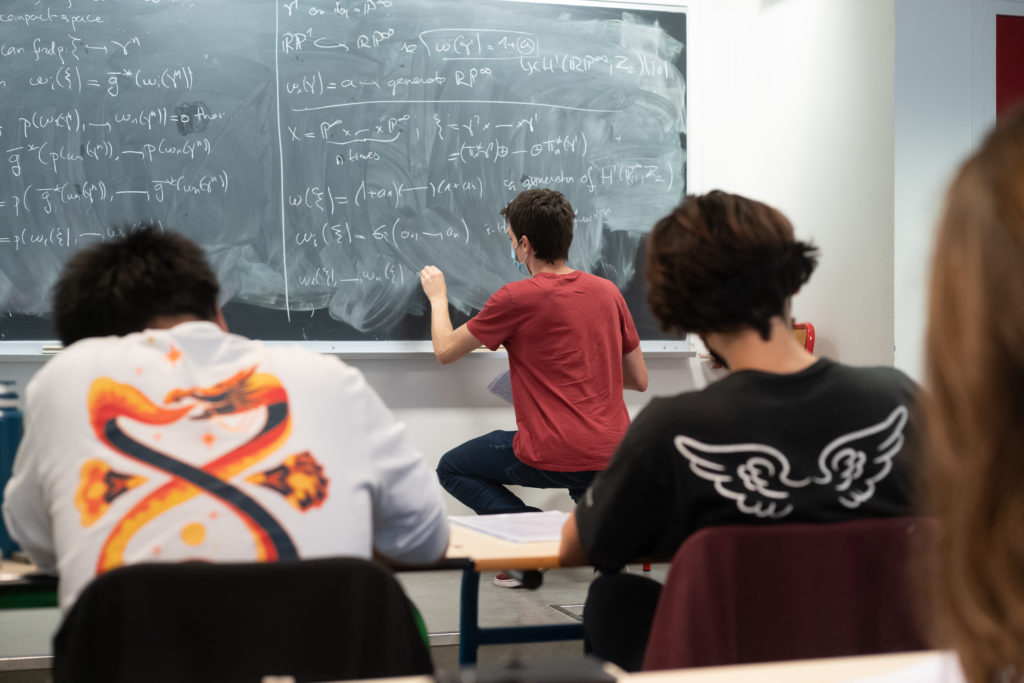The curricula are individual and are set up at the beginning of each year with the tutor, the director of studies or teaching and the department supervisors.
There are four cursus:
- mathematics,
- mathematics/computer science,
- mathematics / physics,
- mathematics/biology.
The multidisciplinary cursus permit, if the jury allows it, the validation of a second specialty for the ENS diploma. The management team may examine any coherent individual proposal for a curriculum presented by the students, as long as it is in the spirit of the program. Students must obtain the approval of their tutor and the director of studies or teaching for all choices concerning their program of study.

Mathematics cursus
First year
Students are registered in the third year of the Bachelor’s degree (L3). They also take courses for the first year of the Master’s program (M1), which will be validated in the second year with the administrative registration in M1. The training also includes courses in computer science, physics, economics and biology. The validation of the first year requires the writing of a thesis, called first year thesis, in the second semester.
Second year
Students are enrolled in the first year of the Master’s program (M1). In parallel, work groups and advanced research courses are offered by specialists. In the second semester, students who have made sufficient progress in their studies can do a long internship, possibly abroad, in a university or a company.
Third year
The third year of the program is devoted to the second year of the Master’s program (M2). Registration in a university is entirely the student’s responsibility. With his or her tutor, the student decides on the additions to be made to his or her training: internship, work groups, additional courses, etc.
At the end of the year, students write a thesis, known as the Diploma thesis, which summarizes all the personal work done during their schooling, adding a presentation of a research area. This thesis is the subject of a mandatory oral defense for the validation of the ENS diploma in mathematics.

Multidisciplinary programs
These demanding courses are a specificity of the ENS. Organized jointly by the Department of Mathematics and Applications and the Departments of Physics, Computer Science or Biology, these courses allow:
- for motivated students to pursue a dual education ;
- for students who are still undecided to postpone their choice between two disciplines for one year.
Mathematics/Physics cursus
In the first year, students validate a mathematics degree and a physics degree. In the second year, they choose either mathematics or physics and join the department of their choice.
Mathematics / Computer Science Cursus
In the first year, students obtain a degree in mathematics and a degree in computer science. Students who enter through the info competitive exam register in the computer science department, and those who enter through the math competitive exam register in the mathematics department. They have a tutor in their department of registration. In the second year, they choose either mathematics or computer science and join the department of their choice.
Mathematics/Biology cursus
Mathematics plays an increasingly important role in the great advances in biology. Conversely, the study of living organisms has become a source of new, profound and difficult mathematical problems. In this context, the mathematics/biology program offered by the Department of Mathematics and Applications, in partnership with the Biology Department of the ENS, aims to train researchers capable of expressing biological problems in mathematical language, developing the mathematical ideas thus generated, and promoting the applications of these new theories to the analysis of the biological systems that gave rise to them.
Objectives of the program
Students in the mathematics/biology program at the ENS will master the basics of contemporary biology. They will have learned to dissect the specialized literature, to follow rapid developments on cutting-edge topics, and to initiate dialogue and collaboration with biologists in their laboratories. The two years of the program allow students to continue, depending on their career path,
- either by taking an M2 in mathematics of modeling,
- or by taking an M2 in biology or cognitive sciences.
Structure of the curriculum
The mathematics/biology program takes place over two years. Students enroll in L3 and M1 mathematics while taking courses in biology and/or neuroscience. Moreover, the biology courses are open to all students in the mathematics department; registration in these courses does not commit students to the full program of the mathematics/biology track.


